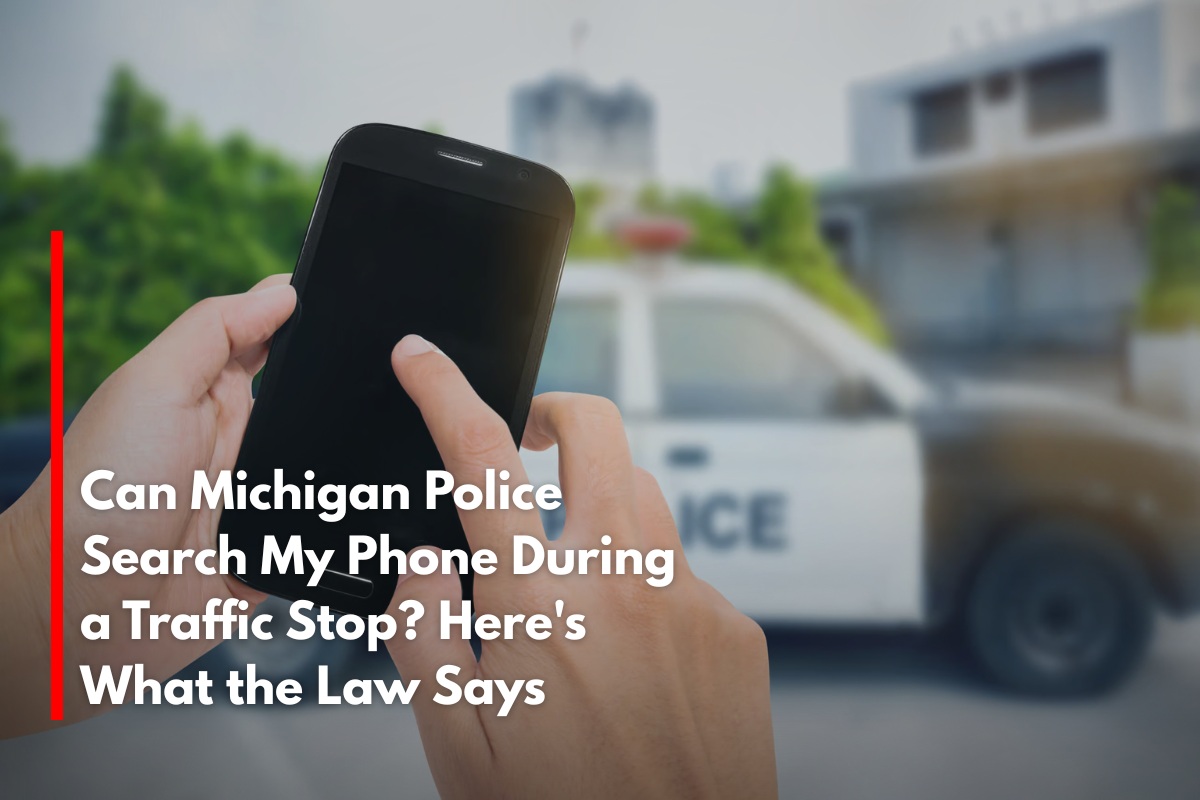With smartphones storing vast amounts of personal information, many residents in Michigan ask whether police can search their phones during a traffic stop. Understanding Michigan’s laws around cellphone searches is vital to protect privacy while complying with legal requirements.
Here is a detailed breakdown of what Michigan law and court decisions say about police searching phones during traffic stops or arrests.
The General Rule: Warrant Requirement for Phone Searches
In Michigan, and across the United States, cellphones enjoy strong protections under the Fourth Amendment, which guards against unreasonable searches and seizures. The U.S. Supreme Court’s landmark 2014 decision in Riley v. California set a clear precedent: police generally need a search warrant to access the data on a cellphone, even after an arrest.
Michigan law reflects this, reinforced by a 2020 amendment to the Michigan Constitution. Article I, Section 11, now explicitly states that electronic data and communications enjoy protection from searches without a warrant that clearly describes the items and is supported by probable cause. This means that unless an officer has a specific warrant, they cannot legally rummage through a person’s phone data during a traffic stop or arrest.
Exceptions to the Warrant Requirement
There are, however, a few exceptions where police might access phone data without a warrant:
Consent: If a driver voluntarily gives permission for officers to search their phone, police can do so without a warrant. It is important to understand that consent must be clearly given and can be revoked.
Exigent Circumstances: In rare cases where there is an immediate threat to public safety, or risk of evidence destruction, officers may conduct a limited phone search without a warrant, but this is closely scrutinized.
Search Incident to Arrest: While police can search the person and their immediate surroundings after an arrest, the U.S. Supreme Court has ruled that this does not justify searching the contents of a cellphone without a warrant.
What Happens During a Traffic Stop?
During a typical traffic stop, police cannot legally demand to search your phone without a warrant or consent. They may ask for your driver’s license, registration, and proof of insurance, which you are required to provide. But searching your phone is a separate issue that is more protected under the law.
If an officer claims to find probable cause—for example, visible evidence on your phone’s screen relevant to a crime—they may seek a warrant to search the device. However, any evidence obtained without proper legal authority can be challenged in court and potentially suppressed.
Michigan Supreme Court’s Recent Developments
In 2025, the Michigan Supreme Court has further clarified the protections around cellphone searches, emphasizing the need for particularity in warrants. This means that the warrant must specify exactly what data officers can access, preventing overly broad or “general” searches of personal devices.
How to Protect Your Rights
If stopped by police in Michigan:
Politely refuse consent to searches of your phone unless the police have a warrant.
Clearly state your wish to remain silent beyond providing necessary identification.
Ask if you are free to leave if you are not being detained.
Contact a lawyer promptly if your phone is seized or searched without proper authorization.
Summary Table
| Situation | Police Authority on Phone Search |
|---|---|
| Traffic stop without arrest | Warrant or consent required |
| Arrest without warrant | Cannot search phone data without warrant |
| Consent given | Police can search without warrant |
| Exigent circumstances | Limited search possible, but rare |
In Michigan, police cannot legally search a phone during a traffic stop without a warrant or the driver’s explicit consent. The state’s laws and court rulings bolster privacy protections around electronic devices given the sensitivity of data stored within. Exercising your right to refuse consent and knowing the limits of police authority is the best way to safeguard personal privacy during traffic encounters.
Sources
(https://www.michigan.gov/msp/le/legal-resources/legal-update/legal-updates/158)
(https://www.benhalllaw.com/can-my-cellphone-data-be-used-as-evidence-after-an-arrest-in-michigan/)
(https://www.baronedefensefirm.com/blog/do-michigan-police-need-a-warrant-to-search-my-cell-phone/)
(https://www.michiganpublic.org/criminal-justice-legal-system/2025-07-31/state-supreme-court-sets-new-guardrails-for-cell-phone-search-warrants)
(https://attorneyperryman.com/blog/what-are-my-rights-during-a-police-search-in-michigan/)











